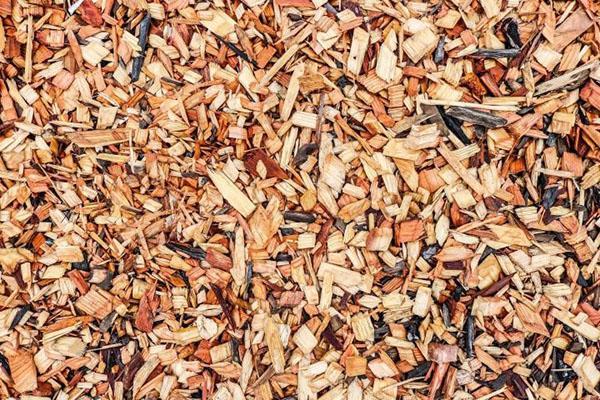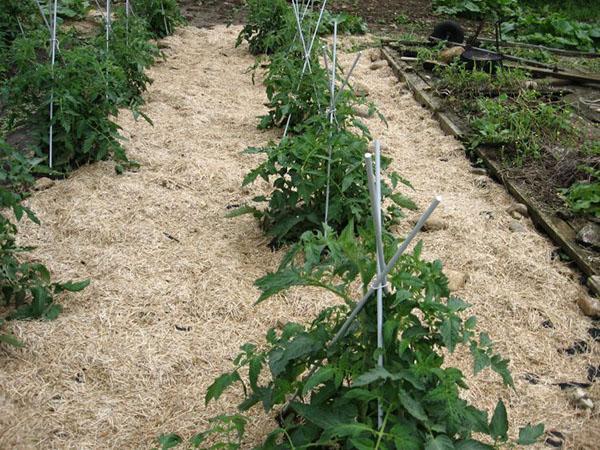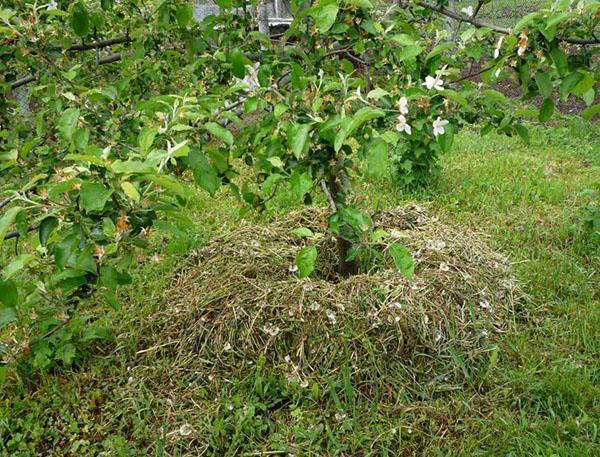Benefits of using soil mulching in the garden, garden beds and flower beds
 Mulching is a common procedure used by gardeners for a number of good reasons. Using the right types of mulch will have a fantastic effect on your garden, however, if done incorrectly, you can achieve the opposite effect. In this article, we will tell you how to mulch the soil.
Mulching is a common procedure used by gardeners for a number of good reasons. Using the right types of mulch will have a fantastic effect on your garden, however, if done incorrectly, you can achieve the opposite effect. In this article, we will tell you how to mulch the soil.
Mulch benefits

- weed resistance;
- preservation of moisture in the ground;
- regulation of soil temperature (keeps it warm on cold nights, and cools during hot periods).
 In addition, the mulch applied in winter will protect the plants from the freeze-thaw cycle that could eventually push them out of the ground. The cover also prevents soil compaction and crust formation, erosion, and prevents rain drops from spreading the soil, which can carry disease from plant to plant. Organic mulch can even serve as a fertilizer.
In addition, the mulch applied in winter will protect the plants from the freeze-thaw cycle that could eventually push them out of the ground. The cover also prevents soil compaction and crust formation, erosion, and prevents rain drops from spreading the soil, which can carry disease from plant to plant. Organic mulch can even serve as a fertilizer.
Disadvantages of mulch
A cover that is too thick can kill plants. For most types of organic mulch, a thickness of 5-10 cm is already a lot. The finer the material, the thinner the layer should be.
 Unfortunately, mulch provides excellent hiding places for slugs and snails. To protect precious plantings, scatter wood ash around them. She will keep pests at a distance.
Unfortunately, mulch provides excellent hiding places for slugs and snails. To protect precious plantings, scatter wood ash around them. She will keep pests at a distance.
 The impervious layer of mulch, like the black film, does not allow air and water to pass through. Even sticky leaves can have this effect, so chop them up first.
The impervious layer of mulch, like the black film, does not allow air and water to pass through. Even sticky leaves can have this effect, so chop them up first.
Wood-based mulch, such as sawdust or wood chips, can pull nitrogen out of the soil when it breaks (under the feet or paws of animals). To counteract this, add a nitrogen-rich fertilizer such as soy or cotton flour to your mulch.
 Dry materials, including sawdust, wood chips, peat moss and straw, can pose a fire hazard. Keep them away from buildings for greater safety.
Dry materials, including sawdust, wood chips, peat moss and straw, can pose a fire hazard. Keep them away from buildings for greater safety.
Mulch types
The ideal mixture should be dense enough to inhibit weed growth, and light and porous enough to allow water and air to enter the soil. Depending on the price and appearance, there are a large number of options to choose from, varying in quality and texture. Below we will tell you about the most popular types.
Organic
 Shredded bark. Keep it away from the base of trees and shrubs to prevent insect pests from switching to them.
Shredded bark. Keep it away from the base of trees and shrubs to prevent insect pests from switching to them.
 Crushed leaves and leaf dust eventually break down and nourish the soil with nutrients.
Crushed leaves and leaf dust eventually break down and nourish the soil with nutrients.
Straw and saline hay resist weeds well.
Grass clippings should be pre-dried or distributed in such a way that they do not turn into a sticky, foul-smelling liquid in the sun. Do not use herbs that have been treated with chemicals.
 Pine needles break down slowly, so don't worry about adding acids to the soil.
Pine needles break down slowly, so don't worry about adding acids to the soil.
Various by-products are also suitable, such as coffee grounds, corn stubs, newspapers and cardboard. Be creative!
Inorganic
 Plastic mulch can be purchased in different colors for different purposes. Red increases the yield of tomatoes, blue has the same effect on potatoes.Black heats the soil, while silver or white reflects light and heat.
Plastic mulch can be purchased in different colors for different purposes. Red increases the yield of tomatoes, blue has the same effect on potatoes.Black heats the soil, while silver or white reflects light and heat.
 Crushed stone, gravel, marble or brick chips are a permanent cover around shrubs and trees.
Crushed stone, gravel, marble or brick chips are a permanent cover around shrubs and trees.
 Agrotextile keeps weeds in check by allowing air and water to pass through.
Agrotextile keeps weeds in check by allowing air and water to pass through.
To reduce the frequency of weeding in our vegetable garden, we use breathable agrotextile in many of our beds.
 After a few spring rains, we put watering hoses in each garden bed and cover them with agrotechnical cloth.
After a few spring rains, we put watering hoses in each garden bed and cover them with agrotechnical cloth.
 Planting holes are cut at different distances depending on the crop type. Watering is effective, and care for a large area becomes noticeably easier. Once the plants grow a little, the tissue becomes less visible.
Planting holes are cut at different distances depending on the crop type. Watering is effective, and care for a large area becomes noticeably easier. Once the plants grow a little, the tissue becomes less visible.
If you have problems with weeds or plant dehydration, follow the advice in this article - start mulching your garden. This simple process will radically change your summer cottage life for the better!